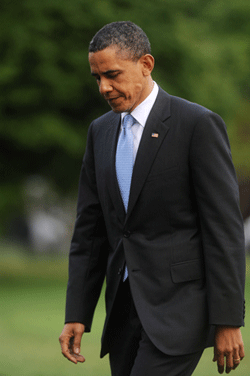Back to the Grind
After his big week, Obama gets reacquainted with the slow, frustrating pace of change in Washington.
Almost seven days to the hour that President Obama announced that Osama Bin Laden had been killed, he appeared on 60 Minutes in his only interview about the operation. The week had been full of disclosures about the mission, but the president still made news. He was only about 55 percent sure beforehand that Bin Laden was in the compound. That he was there suggests some Pakistani officials knew Bin Laden was in the country. Obama never told his family about the operation. Perhaps the most fascinating part of the interview was watching Obama try not to admit that he was watching the 40-minute operation unfold in real time.
After Live From Abbottabad, we now return to our regular programming. The Bin Laden killing was a singular moment of high drama. Now the president must turn to the scratchy partisan theater where progress on vital issues is frustratingly slow and he has limited influence over the public debate.
The president's aides talk a lot about his equanimity. He doesn't get too high or too low. As if to test that proposition, he is following his week of adrenaline with a few tumblers of tryptophan. Tuesday he gave a speech in El Paso, Texas, on immigration reform, and Wednesday he'll participate in a CBS town-hall meeting on the economy.
In planning the commando raid on the Bin Laden compound, the president ran meetings in which his military advisers sketched out the step-by-step process of how the raid would unfold using pictures of its layout. The president picked the riskiest option, which got even riskier when the helicopter crashed and the Navy SEALs had to blow holes in the wall instead of repel onto the roof.
Compare that with a senior administration aide's description of what the president would be doing Tuesday in his speech on immigration: "He will lead a constructive and civil debate. … He is helping to elevate the debate. ... He held a meeting with some very high-level stakeholders ... including some new faces and voices for this debate. … All of this has been aimed at expanding the number of voices and to elevating the debate ... acknowledging the reality that elevating the debate by himself is less likely to get us to an outcome than elevating this debate along with many other partners around the country."
Is there no limit to our imperial presidency? This will inexorably lead to a plenary session. Last week administration officials were blamed for embellishing an already impressive military action. It's the other 94 percent of the presidency they should be improving. After his remarks, the president will ride a Harley along the border and participate in a narcotics raid.
The president was more specific than that preview would suggest. He did point to improvements in border security that have slowed the flow of illegal immigrants, though his push for comprehensive legislative reform was fuzzy. Republican opposition and an all-consuming budget debate limit the chances for immigration legislation. And before long the 2012 election is likely to get in the way.
On Wednesday the president will also have to stretch for specificity. The stakes couldn't be higher. Voters care more about the economy than any other issue, and they are not happy with Obama's stewardship. Despite the overall improvement in Obama's approval rating after the Bin Laden killing, his approval ratings on the economy have dropped. His approval rating on the economy is at its lowest level in the CBS and NBC polls.
The main driver, according to pollsters, is the high price of gasoline. What can he do about this? Nothing that will immediately satisfy voters. I asked his top economic adviser, Austan Goolsbee, who outlined the president's three-part energy strategy. It is mostly aimed at long-term fixes to keep the annual price spikes from happening in the future.
The town-hall format is likely to exacerbate this disconnect across all economic issues. Audience members will be full of concern and want immediate action, and the president will not be able to solve their problems or counsel much more than patience. This formula led to an uncomfortable moment in a similar town hall in September. A woman who described herself as a "middle-class American" articulated the frustration people were having with the president's inability to deliver: "I'm exhausted. Exhausted of defending you, defending your administration, defending the man for change I voted for, and deeply disappointed with where we are right now. I've been told that I voted for a man who said he was going to change things in a meaningful way for the middle class."
The next few weeks will be consumed with a debate over lifting the debt limit. There will be speeches, empty threats, and marathon negotiations at long polished wood conference tables. In his 60 Minutes interview, Obama said the raid ranked as among the longest 40 minutes of his life. But compared to the glacial pace of action on the president's domestic agenda and economic issues, those 40 minutes may soon feel to him like a blink of the eye.
Become a fan of John Dickerson on Facebook.

